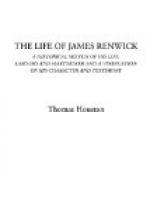The testimony which Cargill and Cameron boldly proclaimed and sealed with their blood, was cordially espoused by Renwick, and faithfully maintained by him during the whole course of his public ministry. He was called, besides, to the great work of preaching a full and free Gospel, throughout many parts of his native country, to multitudes who were hungering for the bread of life, when through terror of oppressive rulers, or from seeking their favour, others shrunk from the performance of so important and hazardous a duty. He was required, moreover, to dispense the ordinances of religion in Scriptural purity, to the scattered, persecuted remnant, and thus to repair “the desolations of Zion,” and to transmit the truth to future generations. In the year of Cameron’s martyrdom, the Societies framed their “General Correspondence,” and formed a simple but effective organization, for mutual fellowship and edification,—for preserving their precious gospel liberties, and for taking advantage of any event in public affairs, for re-establishing the Covenanted order in Church and State, which had been violently taken away, by despotic power and prelatic intolerance. The extent of this organization, in a time of great suffering is remarkable. Gordon of Earlston, when examined before the Privy Council in 1683, with the instruments of torture placed in view, testified that several counties were divided into districts, of which there were 80, with 7000 associated members. There is evidence that, chiefly through the Divine blessing upon Renwick’s faithful preaching, and his singular wisdom in council, those Societies increased, instead of diminishing, in the latter part of the prelatic persecution.
To the friends of evangelical truth, and the faithful witnesses for the Redeemer’s royal prerogatives, the services of Renwick, at the crisis in which he exercised his public ministry, were invaluable. He was eminently the man for the time. Through the influence of the unhappy Indulgence, the strict Covenanters were reduced to what they style themselves in the “Informatory Vindication,” a “wasted, suffering, anti-popish, anti-prelatic, anti-erastian, anti-sectarian remnant.” By the death of Cargill and Cameron, they were left as “sheep without a shepherd,”—broken and scattered. Through the fierceness of persecution, and the machinations of enemies, they were in danger of falling into confusion, and of being entirely wasted and destroyed. We admire the gracious providence of God in preparing, at this particular crisis, an instrument of such rare and suitable endowments for feeding “the flock in the wilderness,” and for unfurling and upholding so nobly the “Banner of truth” amidst hosts of infuriated enemies.




